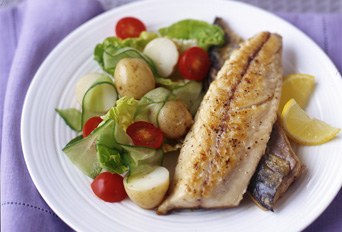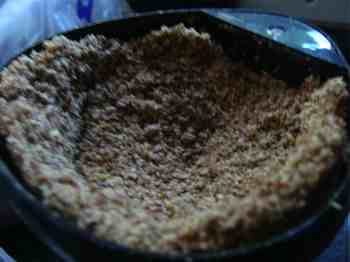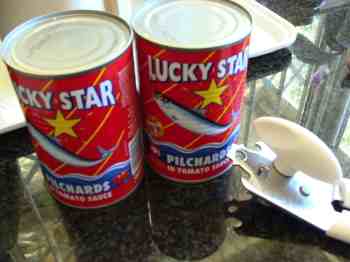- Bernard Preston homepage
- Nutritious choice foods
- Mackerel Recipes
Mackerel Recipes
I could list a hundred reasons why mackerel recipes were on the menu in our home every single week when we lived in Holland. Now in South Africa we have to make do with snoek, its first-cousin, but it is hard to get; and some canned pilchards.
The point is that we absolutely must get plenty of omega-3 in our diet; at least 30% of the brain, for example, is built using these fatty acids.
This page was last updated by Bernard Preston on 24th April, 2021.
Scientists used to think fat was the great-enemy. Now it's quite
apparent they were very wrong; refined carbohydrate gets that trophy.
Let's start with perhaps half a dozen of those mackerel benefits.
- Bernard Preston homepage
- Nutritious choice foods
- Mackerel Recipes
- Anything
that is good, tastes wonderful, and can be prepared in minutes rather than hours is promoted to the top of the list. If it's dirt-cheap that is a bonus. It really is about slow food, made fast.
- Mackerel has zero carbohydrate, which makes it the perfect food to go on one of our free weight-loss programs.
- It has protein of the highest calibre.
- It is rich in the fats that have now been proved umpteen-times over to reduce blood pressure, delay that heart attack for two decades and increase the intelligence of your children; reducing attention deficit and helping stop senile dementia are bonuses. I could go on.
- It's full of the anti-oxidant minerals like zinc, magnesium and selenium.
- It's very high in vitamins, and especially B12, and A that we desperately need more of; it is rich in D, which is in very short supply if you live north or south of latitude 40 degrees.
- Asthmatics taking vitamin D supplements are 50% less likely to have a severe attack requiring hospitalisation and cortisone treatment. It's likely but at this stage unproven that those getting large amounts of vitamin D regularly in their food, and from sunshine, would get the same protection.
- Those with adequate levels of vitamin D are far less likely to suffer from age-related AMD, the most common cause of blindness in the elderly; read more about it at lutein macular degeneration.
"Calories are the little sh*ts that get into your wardrobe at night and sew your clothes tighter."

Mackerel Recipes
These mackerel recipes you can literally throw together in five-minutes.
- Peel the skin off your smoked mackerel; it is easy. Using a sharp knife remove the head and then slide the knife between the backbone and the flesh. The flesh just slips off. Repeat on the other side.
- Wash
some lettuce leaves, quarter a tomato and slice some cucumber; and your
other favourite salads. We regularly use radishes, avocado and celery, laying them out on each plate. Just follow our Olive Garden Salad Recipe if need more help.
- Place
a good scoop of your favourite-dips. We like hummus and spicy Moutabel
baba ghannouj, and those made with cream cheese with our salad.
Fat in your mackerel
Fat gets a lot of bad press, but the fact of the matter, your brain
and nerves are largely fat. Keep it from your baby, and he will turn out to be a moron. Literally, and as an adult you'll prematurely get senile dementia.
In 100 g of mackerel, there are 18 g of fat. Subdivided as follows:
- Saturated fat: 4g
- Mono-unsaturates: 7g
- Poly-unsaturates: 4.3g
Polyunsaturated fatty acids (PUFA)
You've probably heard of the miracle food, omega-3. These three fatty acids are PUFAs, and your 100g mackerel filet is very rich in them:
- EPA: 0.5g
- DPA: 0.1g
- DHA: 0.7g (this is the one that protects your marbles!)
I've done a troll of the net; there are literally hundreds of companies peddling Omega-3 soft gels, and the price varies widely. Buyer beware is the slogan.
As a general rule:
- They contain none of the extremely friendly mono-unsaturates.
- Only Extend Life of those I checked has DPA.
Cost factor
We regularly bought a smoked mackerel whilst living in the Netherlands. They weigh around 280g, so roughly, once you've removed the head, skin and spine, there are about two 100g portions.
Because it's already cooked, it is instantly ready. It is the perfect slow food, made fast. And it costs less than $2/ 100g.
- To get the equivalent amount of Omega-3 as in 100g of mackerel you would need about 4 softgels costing from Kirkland 14c, Puritans Pride 14.7c, Omega Cardio 34c, H Store 56 cents, ExtendLife 135c. (all in $, all excluding postage).
With postage, Puritans Pride (if you buy bulk) with postage will cost you 18.2c to get the equivalent Omega-3 in 100g mackerel.
- It
does make some sense to take fish-oil capsules but, for my money, I would rather
eat more seafood. It is cheaper and nicer, but you won't be enjoying it every
day. It's real help for your bones, cartilage, and nervous system; and your immunity.
Fish vs the Oil
Comparing the price of apples and oranges is a vain exercise; with whole fish verses oil too. With your 100g mackerel recipes you're not only getting the antioxidant, but also 26g of high-quality protein, important minerals and vitamins; monounsaturated fatty acids, other PUFAs than omega 3 and vitamin D too. It is all good stuff.
However even better than food rich in vitamin D is regular exposure to sunshine; surprisingly at noon it is less damaging to the skin.
It all comes back to philosophy. Do you trust what nature made over and above what factories can manufacture? Or would you rather get your vitamins and minerals out of a bottle? Or, indeed, does a combination of the two have more appeal?
We believe there is a place for supplement, but it can never be a substitute for fresh nutritious foods.
Are you a vegetarian?
Then you won't like our mackerel recipes.
Newsletter
Our newsletter is entitled "create a cyan zone" at your home, preserving both yourself and Mother Earth for future generations; and the family too, of course. We promise not to spam you with daily emails promoting various products. You may get an occasional nudge to buy one of my books.
Here are the back issues.
- Lifestyle and ideal body weight
- What are ultra-processed foods?
- Investing in long-term health
- Diseases from plastic exposure
- Intensive lifestyle management for obesity has limited value
- A world largely devoid of Parkinson's Disease
- The impact of friendly bacteria in the tum on the prevention of cancer
- There's a hole in the bucket
- Everyone is talking about weight loss drugs
- Pull the sweet tooth
- If you suffer from heartburn plant a susu
- Refined maize meal and stunting
- Should agriculture and industry get priority for water and electricity?
- Nature is calling
- Mill your own flour
- Bake your own sourdough bread
- Microplastics from our water
- Alternative types of water storage
- Wear your clothes out
- Comfort foods
- Create a bee-friendly environment
- Go to bed slightly hungry
- Keep bees
- Blue zone folk are religious
- Reduce plastic waste
- Family is important
- What can go in compost?
- Grow broad beans for longevity
- Harvest and store sunshine
- Blue zone exercise
- Harvest and store your rainwater
- Create a cyan zone at your home
You have to work quite hard to get enough omega 3 from a vegetable. The best sources are flax seed and walnuts, but they must be freshly-ground, or cracked.
The omega-3 is very strong antioxidant; the downside is that the moment it comes into contact with the air it starts going rancid.
I grind my flaxseed daily, and either crack my own walnuts or enjoy them vacuum-packed.
Use a tablespoon of freshly ground flaxseed with your muesli; I always add it to our low GI bread to increase the fat-content and lower the glycemic index of the starch. Actually I no longer do this as it makes the loaf sink so instead we have it in our kefir smoothies.

Use a dedicated, inexpensive coffee grinder for your flaxseed and other herbs and spices; it doesn't enhance the flavour of your fresh-roast.
Living far from the ocean?
If you like me now that I've retired to sunny South Africa, live from from the sea, then you'll know that it is very difficult to get fresh fish, and especially the cold water variety; mackerel recipes are simply not available. The alternatives are very expensive imported salmon from the fjords of Norway, or our own west coast canned-pilchards.

Did you find this page interesting? How about forwarding it to a friendly book or food junkie? Better still, a social media tick would help.
- Bernard Preston homepage
- Nutritious choice foods
- Mackerel Recipes
Address:
56 Groenekloof Rd,
Hilton, KZN
South Africa
Website:
https://www.bernard-preston.com